人教版高中英语必修三第四单元
- 格式:ppt
- 大小:1.48 MB
- 文档页数:12
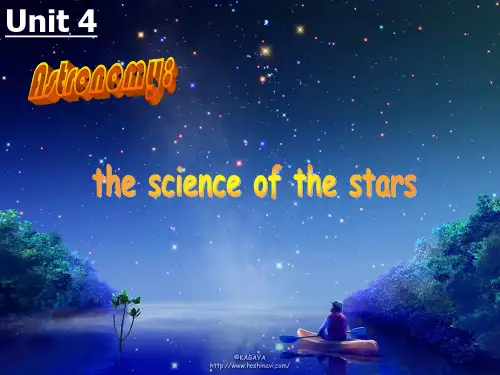
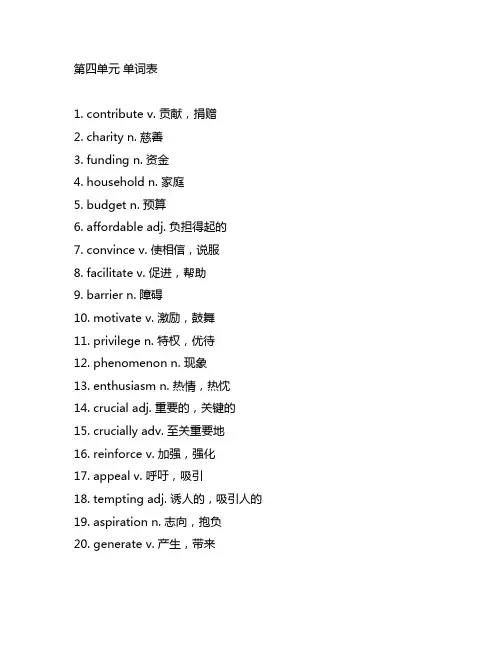
第四单元单词表1. contribute v. 贡献,捐赠2. charity n. 慈善3. funding n. 资金4. household n. 家庭5. budget n. 预算6. affordable adj. 负担得起的7. convince v. 使相信,说服8. facilitate v. 促进,帮助9. barrier n. 障碍10. motivate v. 激励,鼓舞11. privilege n. 特权,优待12. phenomenon n. 现象13. enthusiasm n. 热情,热忱14. crucial adj. 重要的,关键的15. crucially adv. 至关重要地16. reinforce v. 加强,强化17. appeal v. 呼吁,吸引18. tempting adj. 诱人的,吸引人的19. aspiration n. 志向,抱负20. generate v. 产生,带来这些词汇是《人教版高中英语必修三》第四单元的单词表,这一单元的主题是“慈善与勇气”,通过学习这些词汇,我们可以更好地理解和掌握本单元的内容。
接下来,让我们逐一解读这些单词的含义和用法。
1. contribute v. 贡献,捐赠这个词可以指个人或组织对某事物的贡献或捐赠。
例如:- Many people are willing to contribute money to charity.- She contributed a lot of time and effort to the project.2. charity n. 慈善Charity是一个名词,表示为了帮助贫困、病弱、孤寡等人而进行的慈善事业。
例如:- She has devoted her life to charity work.- The charity provides food and shelter for homeless people.3. funding n. 资金Funding指提供资金的行为或者资金本身。
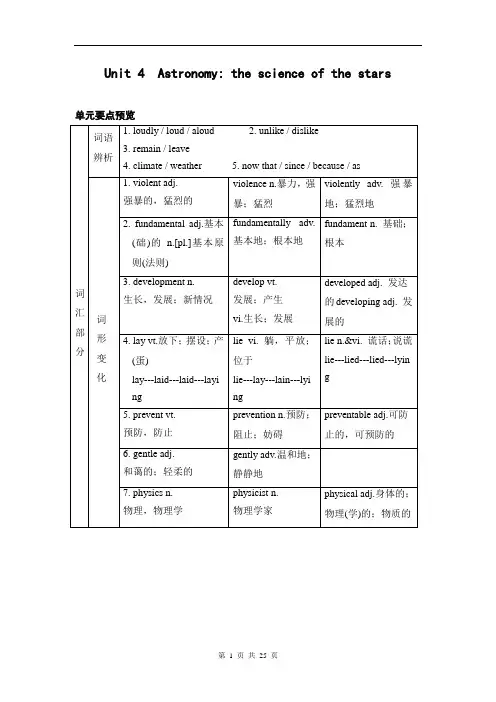
Unit 4 Astronomy: the science of the stars 单元要点预览语言要点Ⅰ.词语辨析Ⅱ.词性变化Ⅲ.重点词汇1. system n.[c] 系统;体系;制度;方法systematic adj 有系统的; 有条理的[典例]1). The solar system includes the sun and its eight planets. 太阳系包括太阳和它的八颗行星。
2). Alcohol is bad for your system. 喝酒对身体有害。
[练习] 根据句子的意思完成句子。
1). The ______ ______ (教育系统) operates very differently in the US and China.2). He introduced us a well-designed ______ ______ (铁路系统).2. lay vt. (laid, laid, laying) 把放下;摆设;铺(地毯) ;产(蛋)[典例]1). He laid his hand on my shoulder. 他把手放在我的肩上。
2). Who should we lay the blame on? 我们该责备谁?[重点用法] lay短语:lay eggs 下蛋lay sth. aside 把某物放在一边;积蓄(钱)lay sth. down 把某物放下lay the blame on sb.责备某人lay the table 摆桌子lay emphasis / stress on sth. 把重点放在某事上[练习] 根据句子的意思在括号里填入适当的词或翻译。
1). The bird ______ its eggs in other birds’ nests.2). He is a political leader that _____ _____ _____ _____ (非常强调) individual responsibility.3). He ______ some money ______ for rainy days.3. harmful adj. 有害的;伤害的harm n.&vt. 伤害(某人)[典例]Many people are aware of the harmful effects of smoking.很多人都意识到吸烟的危害。
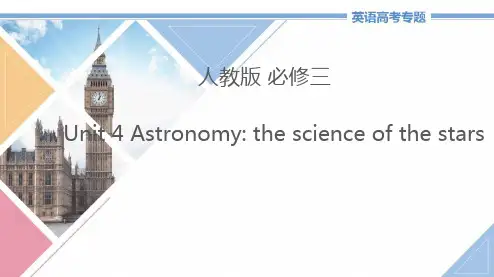
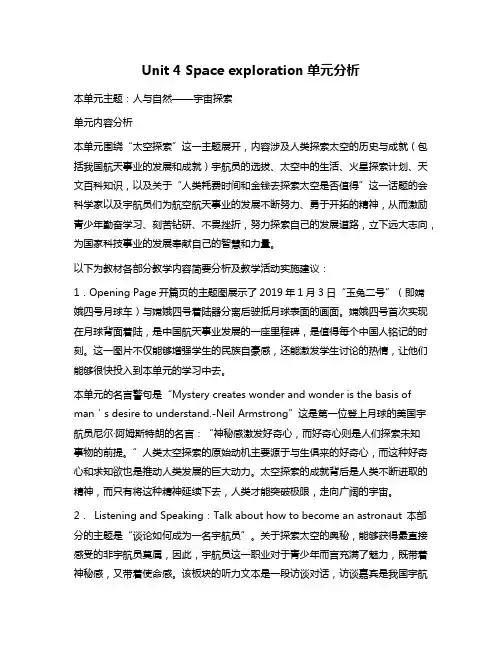
Unit 4 Space exploration单元分析本单元主题:人与自然——宇宙探索单元内容分析本单元围绕“太空探索”这一主题展开,内容涉及人类探索太空的历史与成就(包括我国航天事业的发展和成就)宇航员的选拔、太空中的生活、火星探索计划、天文百科知识,以及关于“人类耗费时间和金钱去探索太空是否值得”这一话题的会科学家以及宇航员们为航空航天事业的发展不断努力、勇于开拓的精神,从而激励青少年勤奋学习、刻苦钻研、不畏挫折,努力探索自己的发展道路,立下远大志向,为国家科技事业的发展奉献自己的智慧和力量。
以下为教材各部分教学内容简要分析及教学活动实施建议:1.Opening Page开篇页的主题图展示了2019年1月3日“玉兔二号”(即嫦娥四号月球车)与嫦娥四号着陆器分离后驶抵月球表面的画面。
嫦娥四号首次实现在月球背面着陆,是中国航天事业发展的一座里程碑,是值得每个中国人铭记的时刻。
这一图片不仅能够增强学生的民族自豪感,还能激发学生讨论的热情,让他们能够很快投入到本单元的学习中去。
本单元的名言警句是“Mystery creates wonder and wonder is the basis of man's desire to understand.-Neil Armstrong”这是第一位登上月球的美国宇航员尼尔·阿姆斯特朗的名言:“神秘感激发好奇心,而好奇心则是人们探索未知事物的前提。
”人类太空探索的原始动机主要源于与生俱来的好奇心,而这种好奇心和求知欲也是推动人类发展的巨大动力。
太空探索的成就背后是人类不断进取的精神,而只有将这种精神延续下去,人类才能突破极限,走向广阔的宇宙。
2.Listening and Speaking:Talk about how to become an astronaut 本部分的主题是“谈论如何成为一名宇航员”。
关于探索太空的奥秘,能够获得最直接感受的非宇航员莫属,因此,宇航员这一职业对于青少年而言充满了魅力,既带着神秘感,又带着使命感。
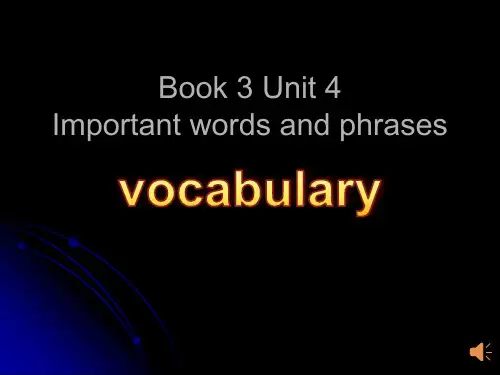
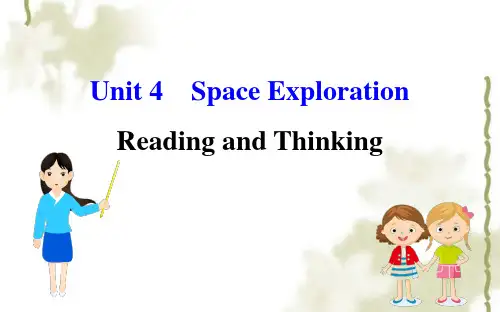
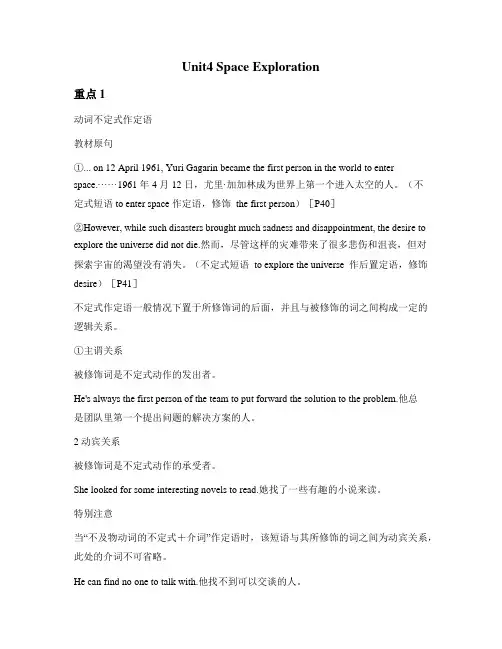
Unit4 Space Exploration重点1动词不定式作定语教材原句①... on 12 April 1961, Yuri Gagarin became the first person in the world to enter space.······1961年4月12日,尤里·加加林成为世界上第一个进入太空的人。
(不定式短语to enter space作定语,修饰the first person)[P40]②However, while such disasters brought much sadness and disappointment, the desire to explore the universe did not die.然而,尽管这样的灾难带来了很多悲伤和沮丧,但对探索宇宙的渴望没有消失。
(不定式短语to explore the universe 作后置定语,修饰desire)[P41]不定式作定语一般情况下置于所修饰词的后面,并且与被修饰的词之间构成一定的逻辑关系。
①主谓关系被修饰词是不定式动作的发出者。
He's always the first person of the team to put forward the solution to the problem.他总是团队里第一个提出问题的解决方案的人。
2动宾关系被修饰词是不定式动作的承受者。
She looked for some interesting novels to read.她找了一些有趣的小说来读。
特别注意当“不及物动词的不定式+介词”作定语时,该短语与其所修饰的词之间为动宾关系,此处的介词不可省略。
He can find no one to talk with.他找不到可以交谈的人。
③部分抽象名词后常接不定式作后置定语。
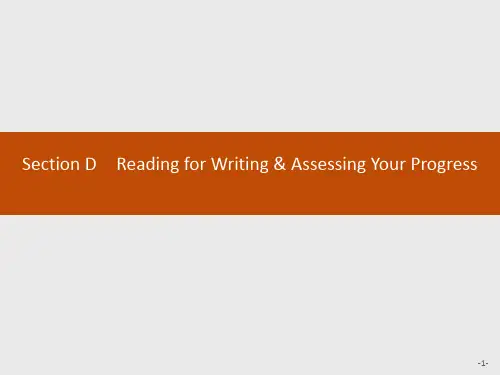
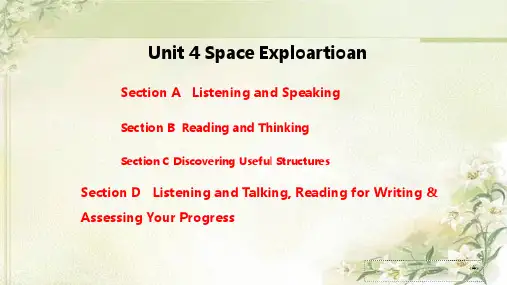
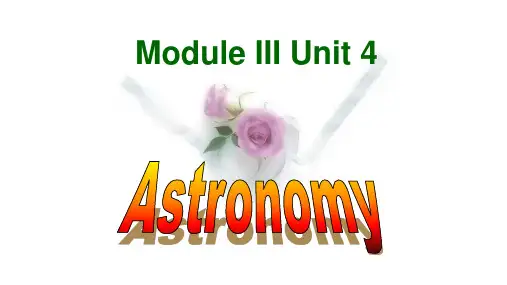
Unit 4 Astronomy: the science of the starsHOW LIFE BEGAN ON THE EARTHNo one knows exactly how the earth began, as it happened so long ago. However, according to a widely accepted theory, the universe began with a “Big Bang ”that threw matter in all directions.After that, atoms began to form and combine to create stars and other bodies.For several billion years after the “Big Bang ”, the earth was still just a cloud of dust. What it wasto become was uncertain until between 4.5 and 3.8 billion years ago when the dust settled into a solid globe. The earth became so violent that it was not clear whether the shape would last or not. It exploded loudly with fire and rock. They were in time to produce carbon dioxide, nitrogen, water vapour and other gases, which were to make the earth’s atmosphere. What is even more important is that as the earth cooled down, water began to appear on its surface.Water had also appeared on other planets like Mars but, unlike the earth, it had disappeared later. It was not immediately obvious that water was to be fundamental to the development of life. What many scientists believe is that the continued presence of water allowed the earth to dissolve harmful gases and acids into the oceans and seas. This produced a chain reaction, which made it possible for life to develop.Many millions of years later, the first extremely small plants began to appear on the surface of the water. They multiplied and filled the oceans and seas with oxygen, which encouraged the later development of early shellfish and all sorts of fish. Next, green plants began to grow on land. They were followed in time by land animals. Some were insects. Others, called amphibians, were able to live on land as well as in the water. Later when the plants grew into forests, reptiles appeared for the first time. They produced young generally by laying eggs. After that, some huge animals, called dinosaurs, developed. They laid eggs too and existed on the earth for more than140 million years. However, 65 million years ago the age of the dinosaurs ended. Why they suddenly disappeared still remains a mystery. This disappearance made possible the rise of mammals on the earth. These animals were different from all life forms in the past, because they gave birth to young baby animals and produced milk to feed them.Finally about 2.6 million years ago some small clever animals, now with hands and feet, appeared and spread all over the earth. Thus they have, in their turn, become the most important animals on the planet. But they are not looking after the earth very well. They are putting too much carbon dioxide into the atmosphere, which prevents heat from escaping from the earth into space. As a result of this, many scientists believe the earth may become too hot to live on. So whether life will continue on the earth for millions of years to come will depend on whether this problem can be solved.A VISIT TO THE MOONLast month I was lucky enough to have a chance to make a trip into space with my friend Li Yanping, an astronomer. We visited the moon in our spaceship!Before we left, Li Yanping explained to me that the force of gravity would change three timeson our journey and that the first change would be the most powerful. Then we were off. As the rocket rose into the air, we were pushed back into our seats because we were trying to escape the pull ofthe earth ’s gravity. It was so hard that we could not say anything to each other. Graduallythe weight lessened and I was able to talk to him. “Why is the spaceship not falling back to the earth? On the earth if I fall from a tree I will fall to the ground. ”I asked. “We are too far from theearth now to feel its pull, ”he explained, “so we feel as if no gravity at all. When we get closer tothe moon, we shall feel its gravity pulling us, but it will not be as strong a pull as the earth’s.”I cheered up immediately and floated weightlessly around in our spaceship cabin watching the earth become smaller and the moon larger.When we got there, I wanted to explore immediately. “Come on, ”I said. “If you are right, my weight will be less than on the earth because the moon is smaller and I will be able to move more freely. I might even grow taller if I stay here long enough. I shall certainly weigh less!”I laughed and climbed down the steps from the spaceship. But when I tried to step forward. I found I was carried twice as far as on the earth and fell over. “Oh dear,”I cried, “walking does need a bit of practice now that gravity has changed. ”After a while I got the hang of it and we began to enjoy ourselves.Leaving the moon ’s gravity was not as painful as leaving the earth ’s. But returning to the earth was very frightening. We watched, amazed as fire broke out on the outside of the spaceship as the earth’s gravity increased. Again we were pushed hard into our seats as we came back to land. “That was very exhausting but very exciting too,”I said.“Now I know much more about gravity!Do you think we could visit some stars next time? ”“Of course,”he smiled, “which star would you like to go to? ”。